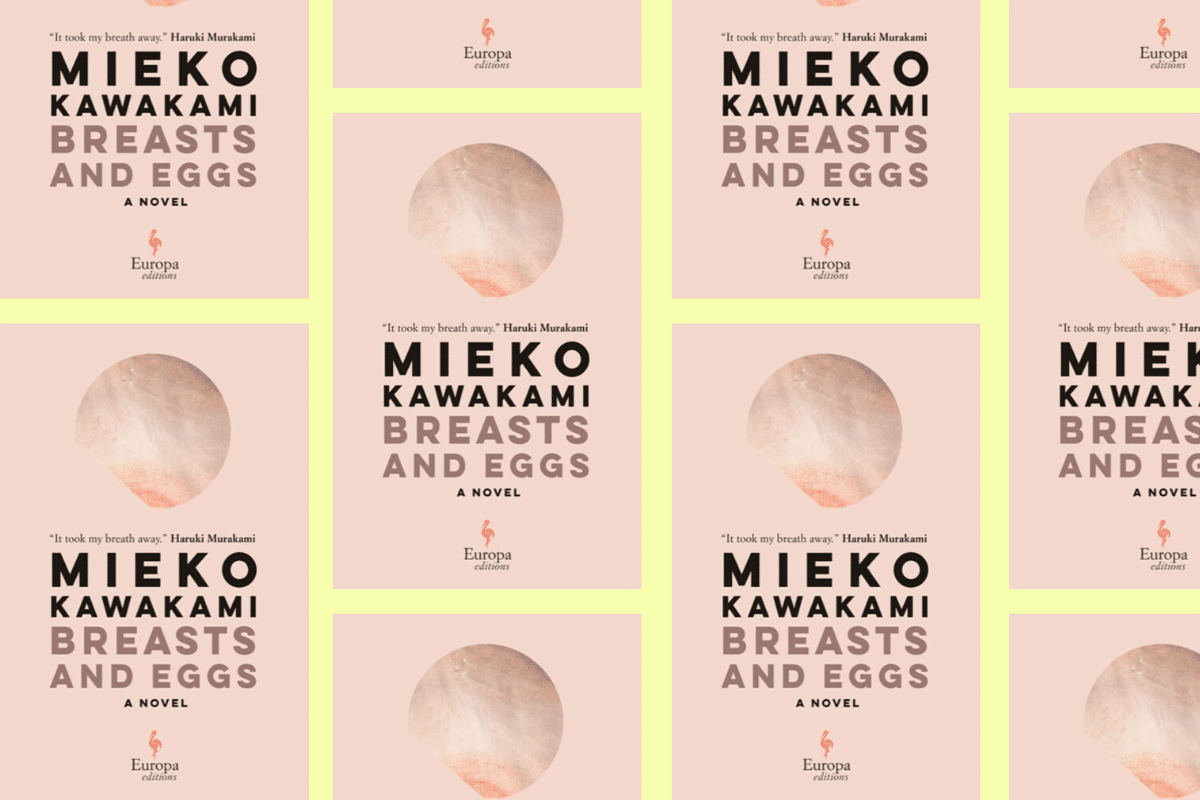ELLA KELLEHER WRITES (in the first of three reviews of new Japanese books) — The title of the novel itself poses a compelling question: does pregnancy and what comes with it (having both breasts and eggs) determine the destiny of the female body?
Breasts and Eggs (2020) tells the story of three women: a thirty-year-old unmarried writer (the narrator) who we learn is named Natsuko, her older sister Makiko, and Makiko’s adolescent daughter Midoriko.
Makiko is unable to cope with how her body changed after giving birth to Midoriko and decides to focus her energy on getting a breast augmentation surgery. Midoriko is entrenched in the fear and fierce hatred of her own changing body which translates into a hatred for her mother. The source of Midoriko’s misery stems from the unbearable condition of being a female in modern Japanese society. In one of her many journal entries, Midoriko writes, “It feels like I’m trapped inside my body. It decides when I get hungry, and when I’ll get my period” (33). The narrator, Natsuko, grapples with filling neither the “mother” nor “daughter” role in Japanese society. She remains as something stuck in the in-between, lacking any real identity.

Mieko Kawakami is among one of the few contemporary Japanese novelists who have reached critical acclaim outside of her native Japan. She stands among literary legends such as Haruki Murakami. Kawakami’s work has a casual and free flowing verse style that is almost reminiscent of a conversation with an old friend, which makes this story all the more personal and realistic. Kawakami has chosen to focus primarily on the lives of women in her stories, something lacking in the larger body of modern Japanese literature.
Makiko’s plight throughout section one of the novel reveals a cruel aspect of Japanese society today, and modern society as a whole. In a desperate attempt to feel like she’s in her twenties, the middle-aged Makiko decides to augment her breasts. Natsuko spends a few lines questioning her sister’s desire to change herself so drastically, but comes to a poignant conclusion, “people like pretty things. When you’re pretty, everybody wants to look at you, they want to touch you… Prettiness means value. But some people never experience that personally.”
For many women, beauty is equal to value in society. Makiko’s response to this societal demand is to surgically alter herself. Natsuko observes her sister’s hysterics passively and becomes even more detached — and at a total loss for her own identity.
In section two of the novel, Natsuko provides the reader with long bouts of emotionally detached inner monologues where her sense of loneliness within a world where she does not quite fit the proper mold of “womanhood” becomes very clear. To remedy this, Natsuko decides she should have a child – except the physical act of sex has always revolted her. In Japan, artificial insemination is forbidden for single women. The options for unmarried women remain thin: either get a sperm donor from outside the country or illegally make arrangements with a donor in Japan. Natsuko seeks guidance and company from various friends, co-workers, editors, Makiko, and Midoriko. The meetings that rattle Natsuko the most, however, are with two people whose biological fathers were anonymous sperm donors.
The first acquaintance is Aizawa, a friendly man whose adopted father loved him. The second acquaintance is Yuriko, a woman whose adopted father was a pedophile who terribly abused her as a child. When Natsuko asks Yuriko about whether or not she should have a child, Yuriko chillingly responds with, “why do people see no harm in having children? They do it with smiles on their faces, as if it’s not an act of violence. You force this other being into the world, this other being that never asked to be born. You do this absurd thing because that’s what you want for yourself” (296). Yuriko’s thoughts on birth and conception spread like cracks on a sheet of ice throughout the course of the novel.
In our tragic existence, where only some are allowed to flourish while others suffocate, Natsuko decides to have a child with Aizawa and raise it as a single mother without his interference. This can be interpreted as Natsuko’s form of liberation from a society that has placed strict constraints on women like her. Instead of “having children,” Natsuko desires instead to “meet them, [her child]” (234).
Yuriko’s thoughts haunt the narrative, especially since Natsuko clearly does not desire motherhood so much as companionship. Natsuko wants to give birth to a friend, someone who will help her cope with her suffocating loneliness. This is arguably a very selfish reason to have a child. The novel ends with Natsuko successfully giving birth to a baby girl, and the reader is left with one question: “Who has the right to bring a child into this world?”

